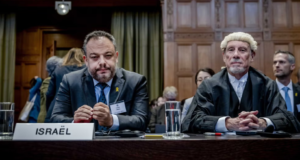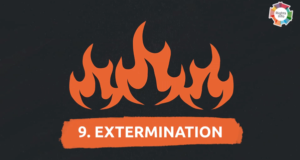By Agence France Presse (AFP)
To view original article, published by The Daily Star on the 19th November, click here
UN rights chief implores Israel to lift illegal siege of Gaza Strip
GAZA CITY: The top United Nations human rights official on Tuesday called on Israel to immediately lift its blockade of the Gaza Strip, as invading tanks from the Jewish state sparked retaliatory rocket fire from the coastal territory. “By function of this blockade, 1.5 million Palestinian men, women and children have been forcibly deprived of their most basic human rights for months,” the High Commissioner for Human Rights Navi Pillay said in a statement.
“This is in direct contravention of international human rights and humanitarian law. It must end now,” she said.
Israel first imposed a large-scale blockade on the Gaza Strip after the Hamas movement won legislative elections in 2006. The Jewish state further tightened its siege of the impoverished territory after the Islamists ousted their Fatah rivals following reports in the Arab press of an impending US-backed offensive by the secular party to topple Hamas in the strip.
Amid mounting pressure from the international community, Israel last week allowed limited industrial fuel to be delivered to Gaza’s sole power plant and on Monday it let in 33 truckloads of humanitarian and other basic supplies.
Israel condemned Pillay’s call as “utterly shortsighted” and sidestepped the call to end the siege by saying she had not addressed the issue of rocket fire targeting Israel.
“It is disappointing to see the high commissioner fall victim to Hamas’ cynical manipulation of the media, and reprint blatant misinformation in her press release,” said a statement by the Israeli mission to the UN in Geneva.
The statement did not address how such “misinformation” would have trumped reports from other UN agencies – as well as scores of human rights groups – backing up Pillay’s description of the situation in Gaza.
Pillay said that “only a full lifting of the blockade followed by a strong humanitarian response will be adequate to relieve the massive humanitarian suffering evident in Gaza today.”
“Decisive steps must be taken to preserve the dignity and basic welfare of the civilian population, more than half of which are children.”
Other UN and EU officials have deemed the Israeli blockade as collective punishment of a civilian population, an act illegal under international law which the Geneva Conventions defines as a war crime.
Limited food distribution to half the Gaza Strip’s 1.5 million population resumed on Tuesday, although the United Nations warned aid supplies would soon run out unless Israel eases its blockade.
“Distribution will go on of the very small amount we brought in on Monday,” said UN Relief and Works Agency spokesman Chris Gunness.
“The supplies will last days, not weeks,” he told AFP.
Crowds rushed to the UNRWA distribution centers to try to get hold of the limited supplies of flour, sugar, rice, powdered milk and luncheon meat.
“I can’t wait to receive the aid. Our lives are in ruins,” said Umm Said, 60, who with her husband looks after 15 children and grandchildren.
On Monday, the first shipment of supplies in two weeks made it possible to resume limited food distribution after a four-day interruption, but Israel again sealed off the Palestinian territory on Tuesday.
UNRWA, which feeds 750,000 people in the impoverished sliver of land, said thousands of dollars worth of powdered milk were lost after Israeli officials slashed the packages for inspection.
“Babies should not be punished by being deprived of milk. I am not aware of babies firing rockets or baby milk being used to power rockets,” said Gunness, adding that food would run out in days unless new supplies are allowed in.
Another UNRWA official has cast doubt on the Israeli pretense of rocket fire for sealing off the territory, noting that no such closure was in effect in the beginning of 2006 when Israel was hit with many more rockets than are currently coming out of Gaza.
An Egyptian-mediated truce signed in June had virtually halted rocket attacks on Israel. Under the terms of the agreement, Israel was to greatly ease its siege, a commitment the Jewish state never complied with.
Israel shattered the truce on November 4 with an invasion of the coastal territory that killed seven Hamas members. The stark violation prompted Gazan fighters to resume rocket fire.
On Tuesday, Israeli armored vehicles came under mortar attack as they invaded southern Gaza in what an Israeli military spokesman described as a search for explosive devices along the border fence.
Hamas claimed it fired a rocket at the vehicles.
Later, Gaza militants fired three rockets that exploded in open areas in southern Israel, causing no casualties or damage, the Israeli Army said.
Israeli officials indicated the crossings were to remain closed on Tuesday.
“This decision has been taken by Defense Minister Ehud Barak because of the continued Palestinian rocket fire at southern Israel,” said Peter Lerner, an Israeli military spokesman.
The Israeli Parliament is to return from its winter recess to hold a special session on the Gaza violence next Monday, a spokesman said. The session was called at the request of the right-wing opposition.
Also on Tuesday, the Israeli Navy arrested Palestinian fishermen and foreign activists off the coast of Gaza on Tuesday, the Israeli military and the International Solidarity Movement (ISM) said.
“This morning a number of Palestinian boats carrying ISM members deviated from the fishing zone off the Gaza coast,” an Israeli military spokeswoman said.
ISM said the boats were 7 nautical miles (13 kilometers) from shore when confronted by the navy, pointing out this was well within the fishing limits set in the 1994 Oslo Accords.
Under the Israeli-Palestinian agreements, Gaza fishermen were allowed to go as far as 20 nautical miles offshore, but Israel has in recent years reneged on that agreement and reduced this to just 6.
The Israeli Navy regularly forces Gaza fishermen to turn back, often by firing machine guns at the civilian vessels.
The Israeli spokeswoman said those aboard the boats were held for questioning after they refused to turn back.
ISM said the 14 fishermen and three human rights observers, who were aboard three boats, were transferred to Israeli warships.
It said Briton Andrew Muncie, Vittorio Arrigoni from Italy and American national Darlene Wallach were volunteers accompanying Palestinian fishermen, “who are regularly attacked by Israeli Navy vessels from as little as 3 kilometers offshore.”
The three had sailed from Cyprus with other pro-Palestinian activists on August 23 in defiance of the Israeli blockade of the Hamas-run Gaza Strip.
The Israeli armed forces said: “ISM is known for its provocative action and for being in contact with terror organizations.”
ISM is a Palestinian-led movement of volunteers committed to nonviolent resistance against the Israeli occupation of Palestinian territory.
It mobilizes international volunteers for often symbolic actions, such as blockade-defying boat trips to Gaza. – AFP, with The Daily Star
 International Solidarity Movement Nonviolence. Justice. Freedom.
International Solidarity Movement Nonviolence. Justice. Freedom.


